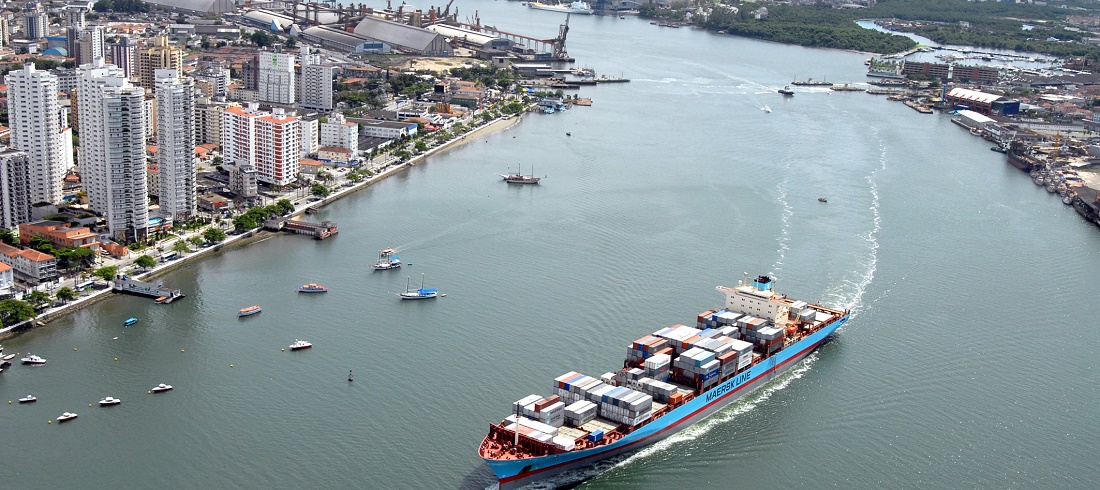
Ship queue grows in Santos amid inspector shortage
Dec, 07, 2023 Posted by Gabriel MalheirosWeek 202345
The delay in issuing phytosanitary certificates for grain shipments and the delay in sending sugar shipments are causing a ship queue at the Port of Santos, the country’s largest. More than 100 ships with goods are waiting at the port. The queues are costing Brazil’s grain exporters $1.2 billion, according to the National Association of Grain Exporters of Brazil (ANEC).
According to Sérgio Mendes, ANEC’s executive director, phytosanitary certificates for grain shipments, which used to be issued within 48 hours, now take 10 days to be made available to exporters because of a shortage of agricultural inspectors responsible for releasing the document.
“The problem is serious,” he said, explaining that the number of inspectors in the Ministry of Agriculture is insufficient. “This is causing concern among our members because exporters are not paid for their goods until the certificate is released.”
To reach at the $1.2 billion figure, ANEC looked at the volume of soybean exports planned for this year, which is 100 million tonnes. Dividing this volume by the amount of soybeans a ship carries (65,000 tonnes) and then dividing by 365 days gives a figure of four ships per day.
Considering that each ship carrying soybeans is “worth” $30 million, that’s $120 million in “cash flow” (working capital that companies don’t receive) per day. Since the average delay in obtaining phytosanitary certificates is 10 days, the result is $1.2 billion in “cash flow,” since this delay process is continuous, ANEC explained.
According to Mr. Mendes, Brazil also loses efficiency in shipping operations compared to its competitors because of the delay in issuing the document. In the United States, for example, certificates are issued within 48 hours.
“There is no slowness in the work of the auditors, but the team of inspectors has been the same for years, while Brazil is exporting more and more soy, cotton, sugar, and corn. As a result, they are unable to cope with such high demand,” he said.
According to Janus Pablo Macedo, president of the National Union of Federal Agricultural Tax Auditors (Anffa Sindical), the Port of Santos currently has 26 specialists, 19 of whom are agronomists and therefore qualified to issue the certificate. But eight more are needed to meet the demand. “The professionals are working hard to meet the requirements in Santos, acting as a task force, with the help of inspectors from other states,” he said.
He said the displacement of the inspectors highlights the shortage of these professionals, estimated at 1,600 by Anffa, a number that could decrease. Of the 2,300 agricultural inspectors working today, 500 are already eligible for retirement.
For the president of Anffa, not even temporary hiring can solve the problem observed by ANEC in Santos. “According to the law, temporary inspectors are not authorized to issue phytosanitary certificates.”
According to the maritime agency Alphamar, a number of factors have caused the queues of ships. The first is related to the delay of sugar shipments at the port, affected by the heavy rains in October, which paralyzed operations for 15 days, according to Arthur Neto, managing partner of Alphamar.
According to the company, 117 vessels are waiting to dock at the port. Of the total number of ships, 51 are loaded with sugar, 34 with corn, 20 with soybean meal, 10 with soybeans, and another two with concentrated and frozen orange juice.
In addition to the rain, the significant and atypical shipments of soybeans in the second half of the year have disrupted the logistics scenario there, according to Arthur Neto. “The dynamics of the port changed this year. Soybeans occupied the sugar export window in October and November. This is very different from previous years when soybeans were exported until July. This causes ships to wait longer.
Another factor is that Santos has had to absorb cargo that wasn’t shipped through the northern ports because of the drought, he added.
In a statement, the Port of Santos confirmed the queue of ships and said it was a “very dynamic situation.” “The queue increases on rainy days and decreases rapidly with favorable weather. In addition, there are other conditions for berthing, such as the convenience of shipowners and terminals and authorizations [from the Navy, health regulator Anvisa, inspection agency Vigiagro, Customs, and Federal Police].”
The Ministry of Agriculture did not respond to a request for comment on the lack of agricultural inspectors in Santos.
Source: Valor Econômico
Para ler a matéria completa, acesse: https://valorinternational.globo.com/agribusiness/news/2023/12/07/ship-queue-grows-in-santos-amid-inspector-shortage.ghtml
-
Grains
Aug, 10, 2023
0
Brazil’s soybean output rise to 157mt; exports at 98.5mt: Abiove
-
Shipping
Dec, 21, 2021
0
Bunker One to Test Biodiesel on Vessels in Brazil in 2022
-
Shipping
May, 03, 2024
0
Freight on Main Global Maritime Routes Rose 1% Last Week
-
Ports and Terminals
Mar, 22, 2022
0
EPL promotes a study for a new port access channel concession at the Port of Paranaguá

